Introduction
- Islam recognizes that humans must undertake various economic activities to survive.
- Islam observes that it is through economic science and economic system that humans satisfy their various economic needs.
- Economic system matters most to Islam because it affects distribution of resources in the society.
- Shari’ah stipulates way means of acquiring, disposing and distributing wealth.
Islam recognizes that humans must undertake various economic activities to survive in a competitive society where resources are limited. It also observes that economic science and economic system enable human beings to satisfy their needs. The economic science, which involves production of goods and services, is the same irrespective of religion or geographical location. Comparatively, economic system determines distribution of resources, and thus of great interest to Islam (Kuran 149). Therefore, Shari’ah (Islamic law) provides means of acquiring, disposing, and distributing wealth.
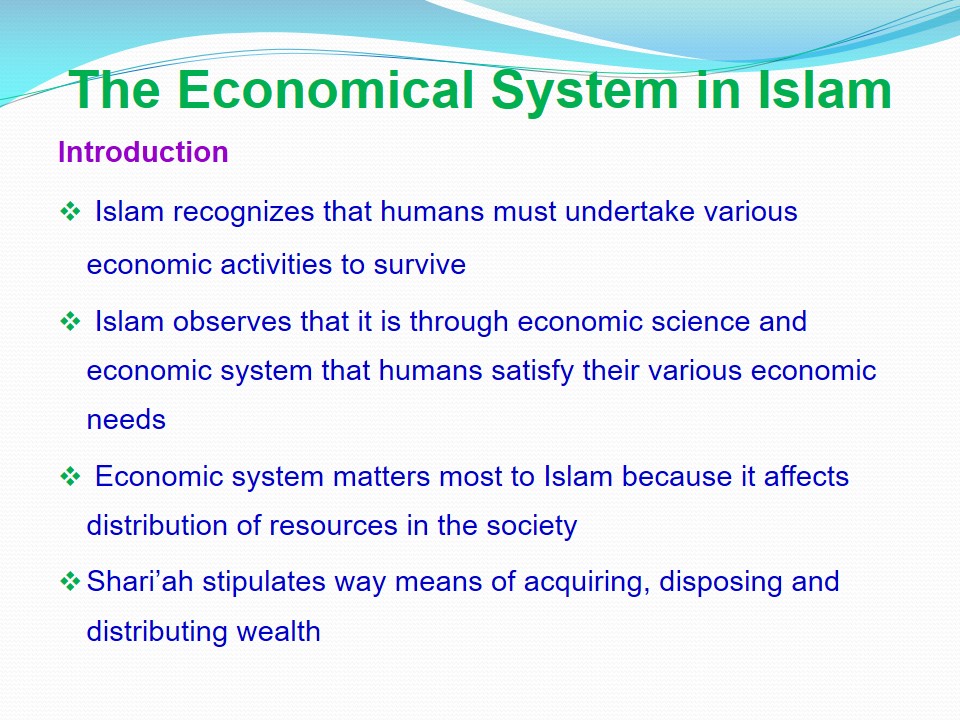
Importance of Islamic Economics
- Islam focuses on economic system as an important aspect of society.
- Economic system enables Islam to alleviate poverty.
- Distribution of resources follows laws of supply and demand.
- Socialism and capitalism are major economic systems that influence distribution of resources.
Economic system of a society is important in Islam because it determines distribution of resources, thus contributes to occurrence of poverty. According to Nabhani and Tahrir, “the economic problem results from the subject of possessing the benefits, not from producing the means which give the benefit” (47). It is through economic system that a society can influence distribution of resources and alleviate poverty. The scarce resources in the society follows laws of demand and supply in their distribution, which are under the influence of an economic system such as socialism and capitalism.
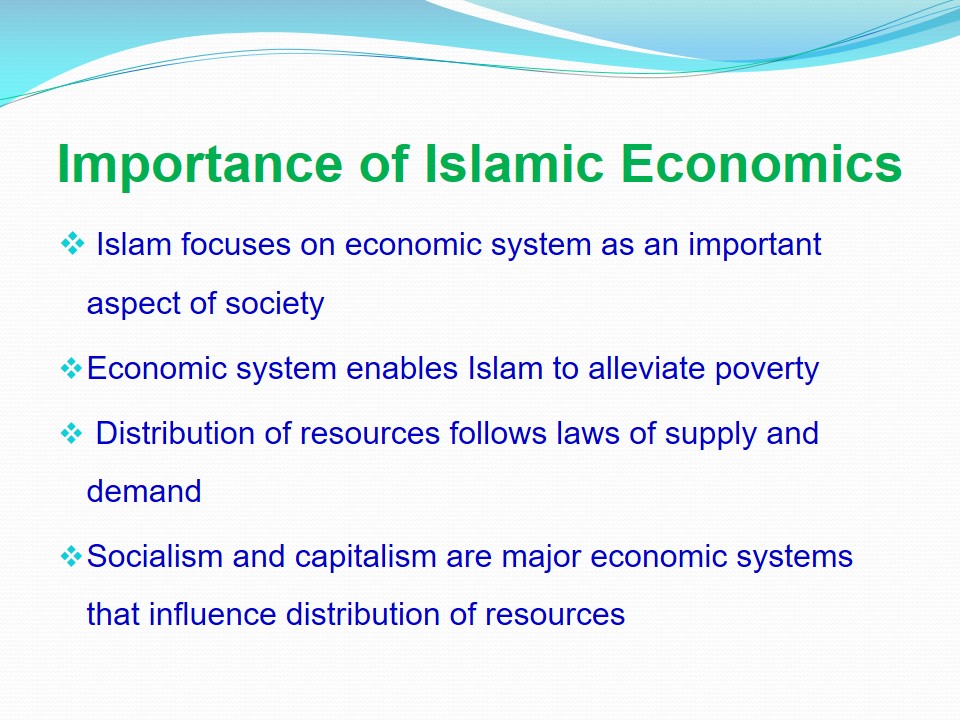
Comparison
- Does not deny an individual right to property as in the case of socialism.
- Does not support capitalism ideology of wealth accumulation in few hands.
- Promotes circulation of resources among population.
- It provides equal opportunities for everybody to access wealth and progress in a competitive society.
Comparatively, Islam economic system is special because it does to deny or limits rights of individuals to property as in the case of socialism. Although it enables capitalism to thrive, it does not support selfish accumulation of wealth among the rich. Hence, it supports circulation and distribution of wealth in the population (Qureshi 103). With equal distribution of wealth in the society, everybody has equal opportunities to access wealth and progress.
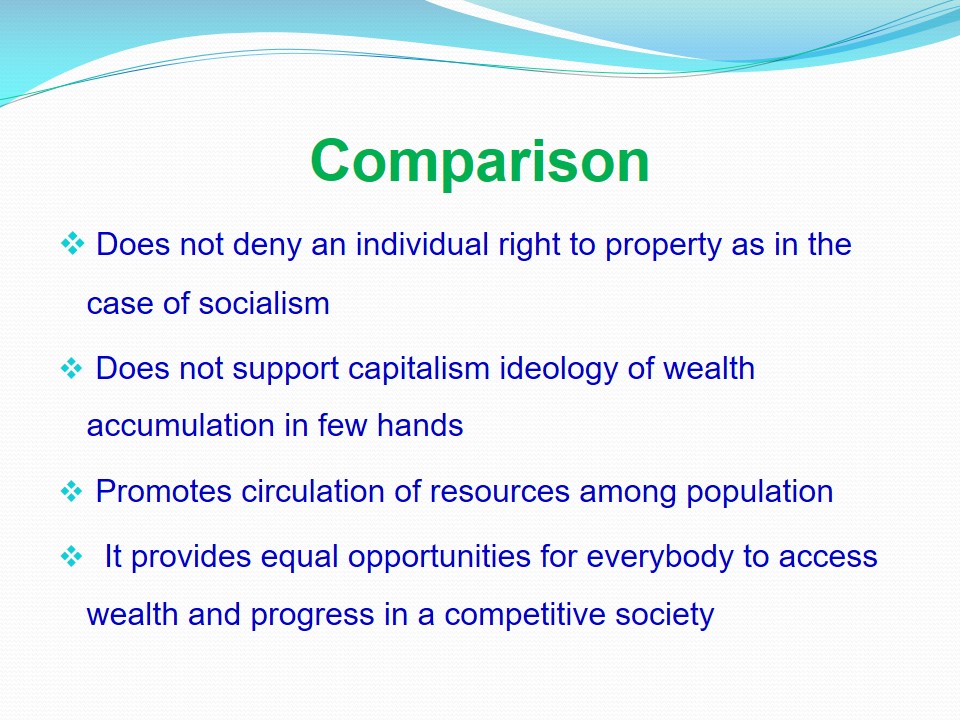
Different Aspects of Islamic Economic System
- Acquisition of resources.
- Principles expenditure.
- Rights of property.
- Exploitation as in capitalism economic system.
- Distribution of wealth or resources in the society.
Islam economic system has different aspects that relates to ownership of property in the society. According to Qureshi, Islamic system has different aspects, viz. acquisition of wealth, principles of spending, rights to property, capitalism exploitation, and distribution of resources. Examination of each of the aspects gives an insight about Islam economic system.
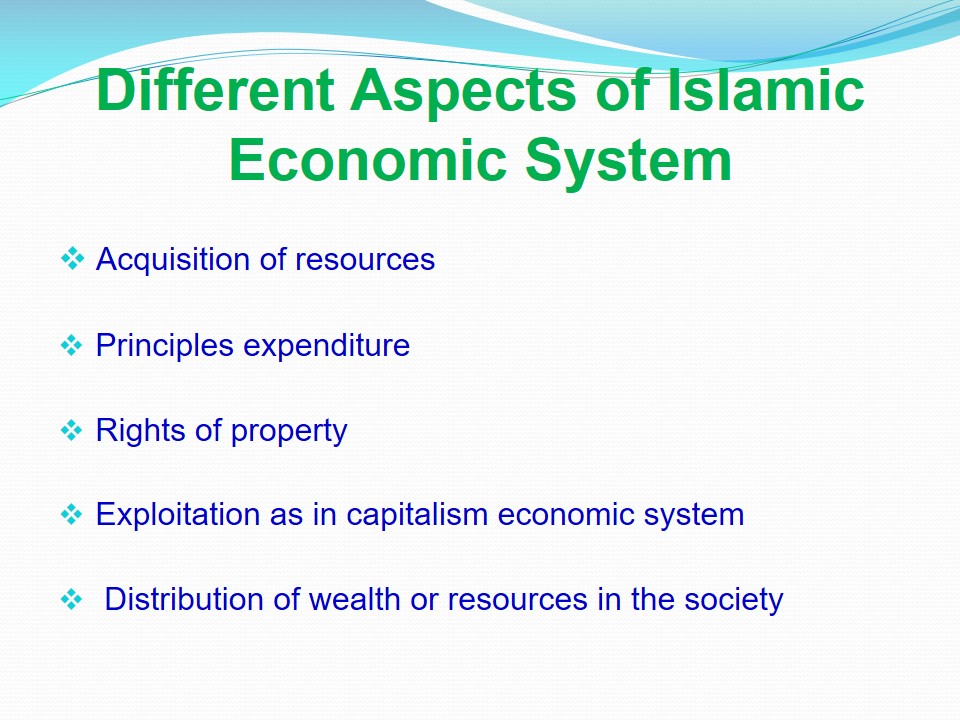
Acquisition of Resources
- Islam does not discourage acquisition of wealth and resources.
- The Quran encourages earning of wealth through legal means because it has blessings.
- Allah expects people to work hard in their labor.
- Islam economic system differentiate lawful and unlawful means of acquiring wealth.
As Islam recognizes that human survive through economic activities, the Islam economic system does not discourage an individual from acquiring resources. Lawful acquisition of wealth is holy as the Quran says that Allah bestows blessings to people who work hard in their labor. According to Qureshi, “Islam has accepted it as a human right that one should try find substance for one’s life over the earth of Allah lawful according to one’s nature, interest, and one’s capabilities and abilities” (104). The Islam does not allow people to indulge in corruption as means of satisfying their daily needs of bread.
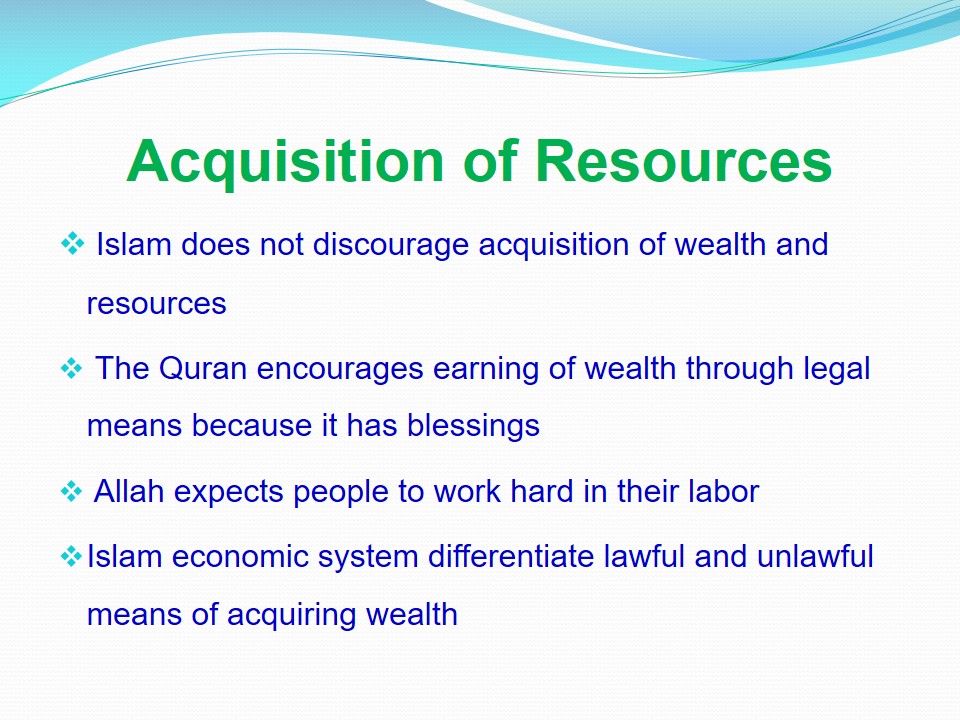
Principles of Expenditure
- Harmful expenditure is immoral.
- One’s expenditure should reflects virtues, social welfare, and good works.
- The less fortunate and the needy members of society require help.
- The Quran urges the people not to squander wealth for the extravagance is evil.
All manners of expenditure that causes harm to individual or society is immoral according to the Islam economic system. Islam holds that the most desirable way of spending legally acquired wealth is by satisfying reasonable needs and saving others for the sake of other people in the society (Kuran 137). The Quran regards those who squander their wealth as brothers of Satan for they are ungrateful to Allah (Qureshi 104). Hence, one should not be mean in the manner of spending wealth for both family and self, because others are in need.
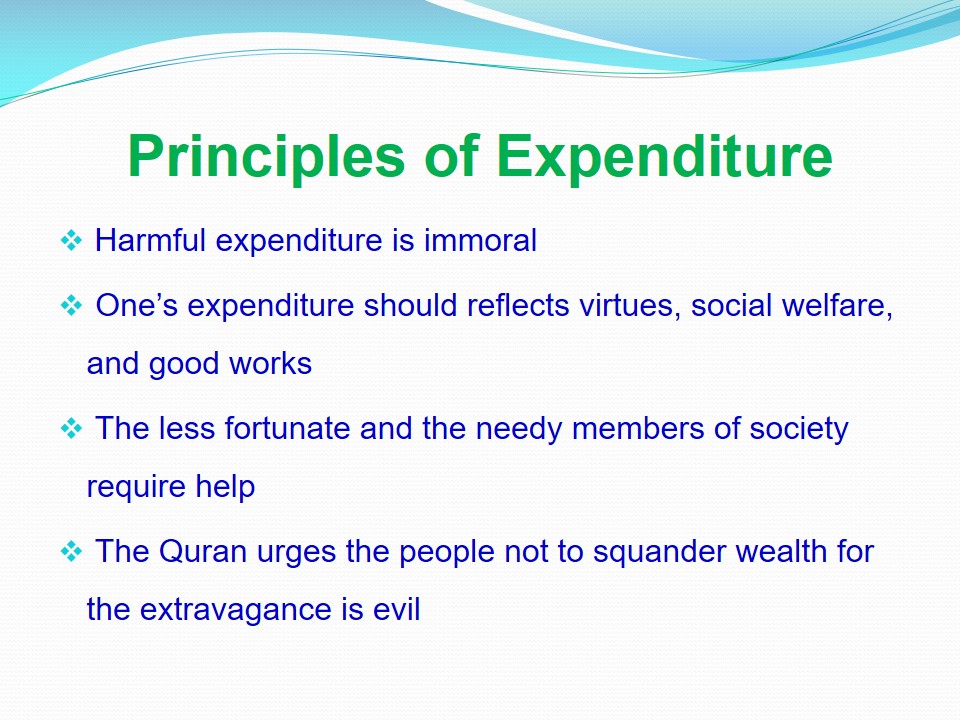
Rights of Property
- Islam bestows right to property ownership if earned through legal means;
- However, Islam places some limitations on the use of properties;
- Hence, there are three possible ways one can utilize the earned property:
- Spending;
- Investing;
- Hoarding.
Islam provides that an individual has a right to own a given property provided the means of its acquisition is legal. However, although one can own any property, limitations arises in the use of earned property. Spending, investing, and hoarding are three possible ways that one can utilize earned property well. “Since wealth has been given to us as a gift from Allah, we should also be generous in giving to others” (Zaman 26). Allah has bestowed wealth to the people, and thus they must utilize it for the common good of all people in the society.

Exploitation
- Islam forbids imposition of interest because it is a form of exploitation.
- If one gives wealth to another, one should not expect interest.
- The Quran says that interests does not increase wealth in the sight of Allah.
- Thus, Islam is against the way capitalism amasses wealth through interests.
Islam perceives imposition of interest on borrowed wealth as a form of exploitation that capitalism has employed in amassing wealth from the population, thus contributing to poverty in the society. The Quran clearly states that Allah does not perceive interests as means of increasing wealth of others because it is oppressive (Qureshi 105). Therefore, the Islam does not support capitalism because it exploits the poor in the society.
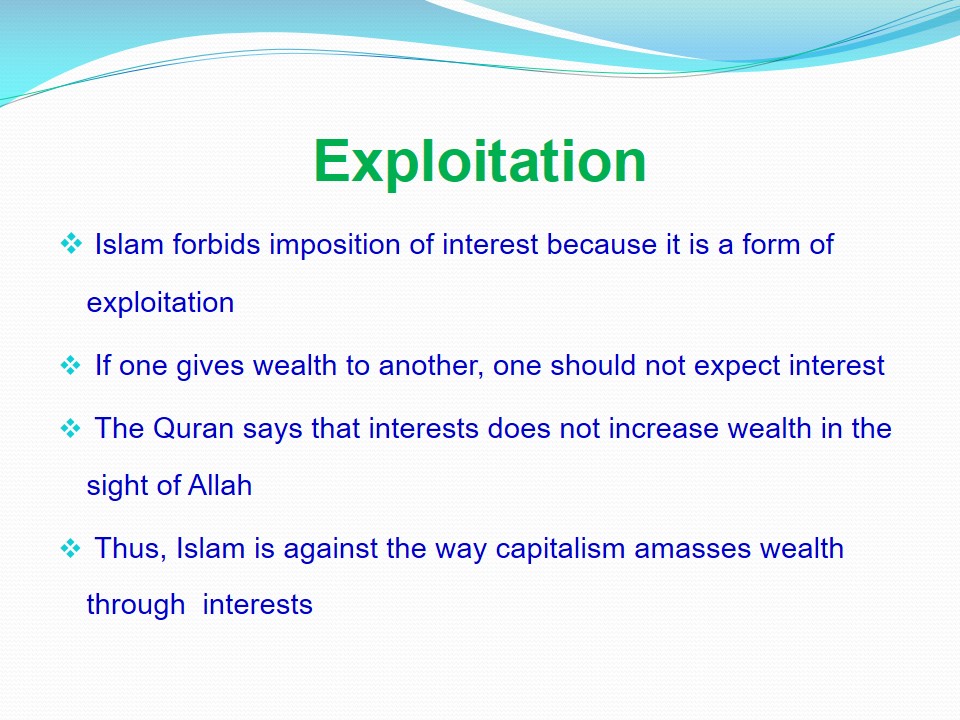
Distribution of Wealth
- Accumulation of wealth is against Islam because it encourages selfishness.
- Wealth is a gift from Allah that people should share for the common good.
- One should spend wealth to satisfy needs, invest in legal businesses or provide to the needy.
- Islam economic system aims at circulating wealth so that populations can access and utilize it.
Accumulation of wealth in the hands of few individuals in against Islam because it encourages selfishness and causes poverty. Most people are poor in the society because the rich people have accumulated wealth, and thus inessential to others. If one continues accumulating wealth, “by Islamic law he has to pay two and half percent annually on it” (Qureshi 105). To avoid penalty, one needs to utilize wealth in satisfying own needs, investing in legal businesses or provide to the needs of the poor.
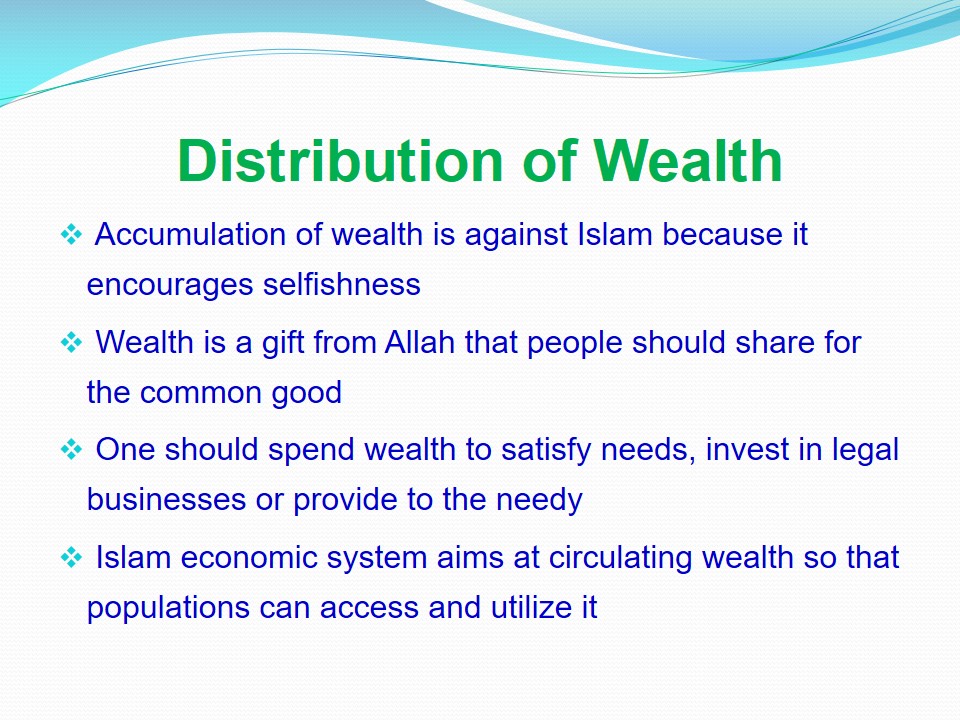
Principles of Economic System
- Economic problems emanates from ownership of wealth.
- Islam economic system has three principles that aid in distribution of wealth:
- Wealth ownership;
- Disposal of wealth;
- Distribution of wealth in the society.
The economic problems emanate from ownership because people have selfish tendencies of accumulating wealth while depriving others. Nabhani and Tahrir state, “the economic problems results from the viewpoint towards ownership, from the ill disposition of this ownership, and from the misdistribution of wealth amongst people” (p. 49). Hence, the Islamic economic system has three principles, which cover ownership, disposal, and distribution of wealth in the society.
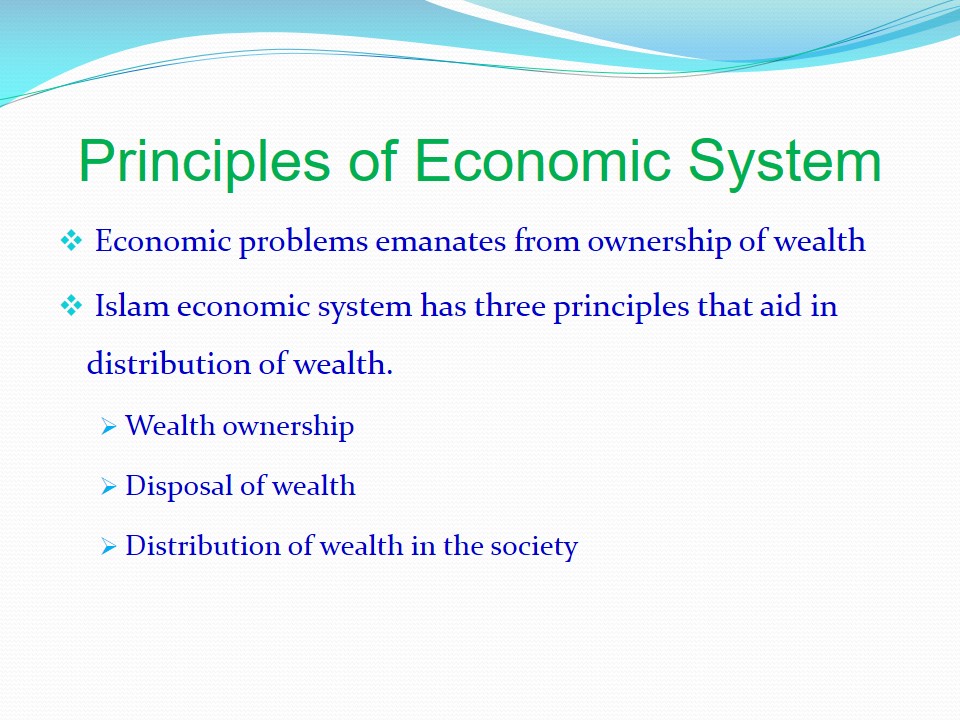
Types of Ownership
- Humans acquire their wealth through various means such as:
- Work;
- Inheritance;
- For sustenance;
- State grants;
- Assuming ownership.
Humans employ several means to gain wealth. Naturally, humans must struggle to gain wealth because is provides means of satisfying various needs. The Islam holds that the means of acquiring wealth should be legal and moral to avoid perpetuation evil in the society. “The acquisition should not be, however, be left to man to achieve, strive for, or dispose of as he wishes, as this would cause evil and corruption resulting in anarchy and disorder” (Nabhani and Tahrir 64). The struggles in the society is inevitable as people have different abilities in acquiring wealth. Moreover, satisfaction of needs varies from one person to another.
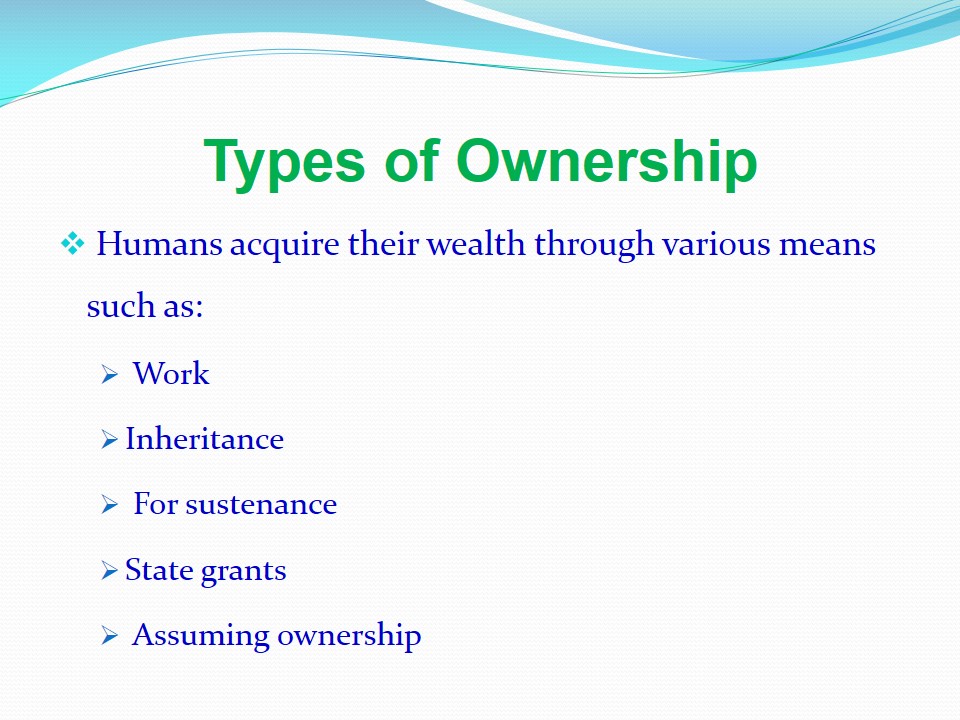
Work (Amal)
- Work provides a major avenue through which people acquire and amass their wealth;
- Amal is term in Shari’ah that encompasses different types of work;
- According to divine rules, legal forms of work include cultivation, mining, hunting, brokerage, partnership, sharecropping, and employment.
Critical observation of generation of wealth shows that work provides a major avenue through which people can acquire their wealth in a legal manner. According to Sheri’ah, the term Amal indicates different forms of work that people perform to acquire their wealth. Allah blesses somebody who dedicates time to work for his labor is fruitful (Mannan 27). Thus, Islam recognizes wealth as a legal means of acquiring wealth.
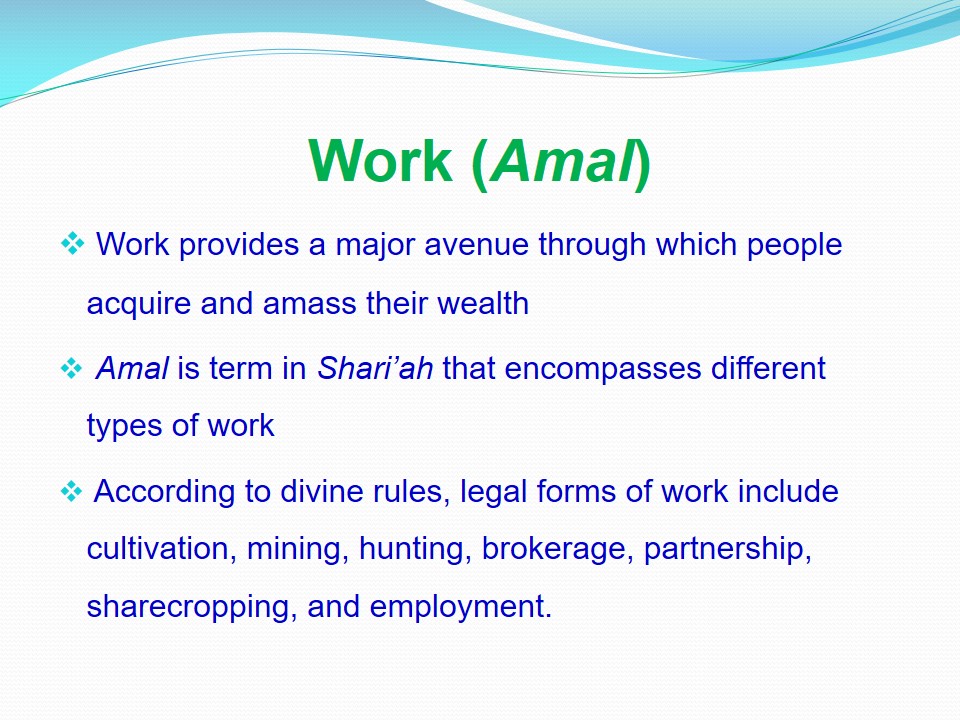
Inheritance
- Islam accepts inheritance as legal means of owning wealth;
- The Quran dictates that male child should get double portion of wealth when compared to female child;
- Inheritance provide means of distributing wealth that has accumulated in one person;
- During inheritance, wealth distribution follows laws of inheritance.
Inheritance is a legal means through which children in the family can acquire wealth from their parents and own them. Inheritance enables children to acquire basic wealth that they can utilize in satisfying their needs and investing to increase. The Quran states that a male child should get double share of inheritance that a female child receives. Nabhani and Tahrir assert, “in order that such accumulation of wealth does not continue after their death, it is then necessary to have a means to divide the wealth amongst the people” (106). Fundamentally, inheritance enhances distribution of wealth among population.
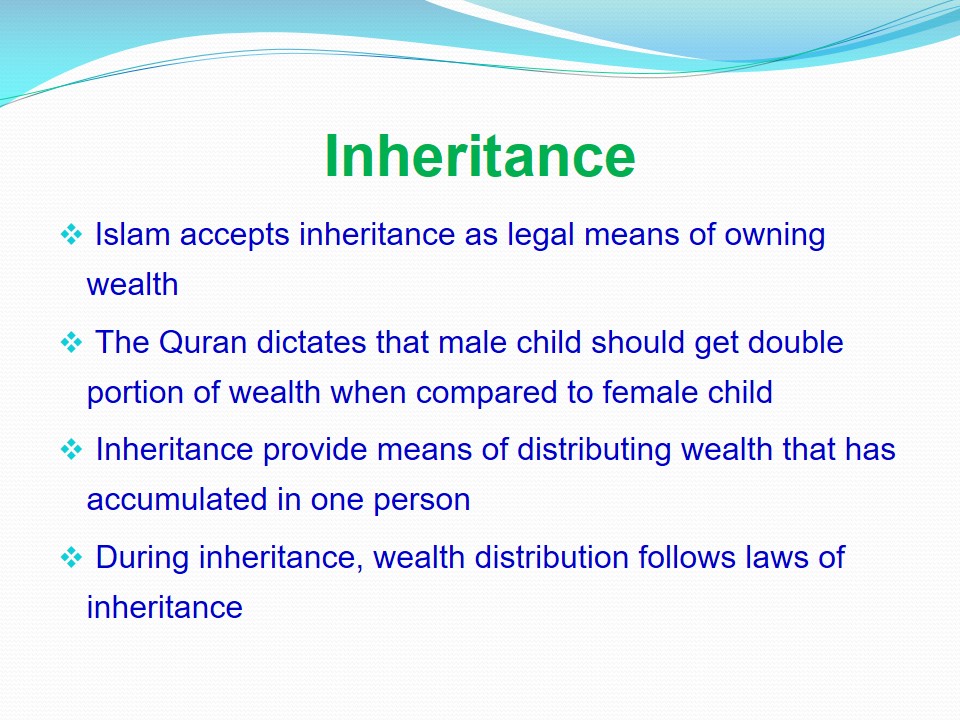
For Sustenance
- One has inalienable right to property ownership for sustenance;
- If a person cannot access basic needs of life due to sickness, disability or due to old age, they have right to get assistance;
- The rich people have duty to support beggars and the destitute;
- Muslim community has duty in providing wealth of sustenance to the needy.
Some wealth fall under basic needs. Individuals who are unable to satisfy their basic have right to own wealth for sustenance. For example, the hunger cannot suffer yet the rich have plenty of food. In this case, the rich have duty to feed the hungry and save them from dying. Nabhani and Tahrir assert, “Shari’ah did not consider the taking of food in the time of famine as a theft for which the hand must be amputated” (108). Hence, the needy satisfy their needs when they gain sustenance wealth.
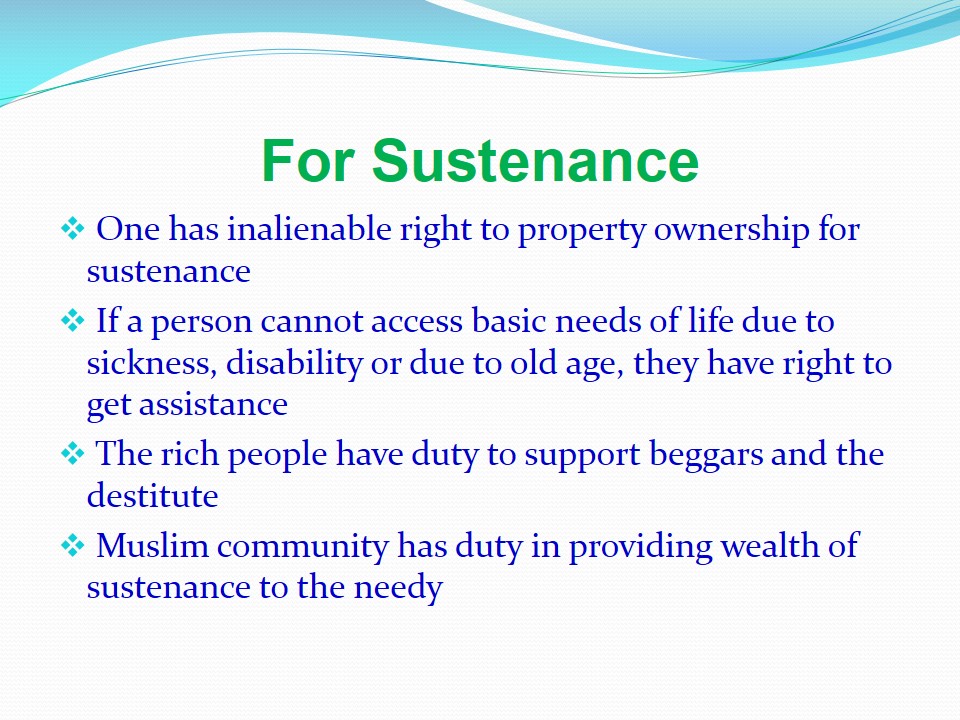
State Grants
- Citizens can gain wealth when state grants them properties.
- State can grant its citizens land, farm inputs, capital for business and animals to keep.
- When citizens gain such property, they utilize in satisfying their needs as well as investing them.
- State grants provides means through which governments can empower its people economically.
State has duty to empower its citizens economically. Given that some citizens are very poor and cannot access means of production such as land, a state can decide to grant them land. An individual can start owning property as grant from government, but continually increases the property by investing on it (Mannan 58). Therefore, state grants is a legal way of acquiring wealth as per Islam.
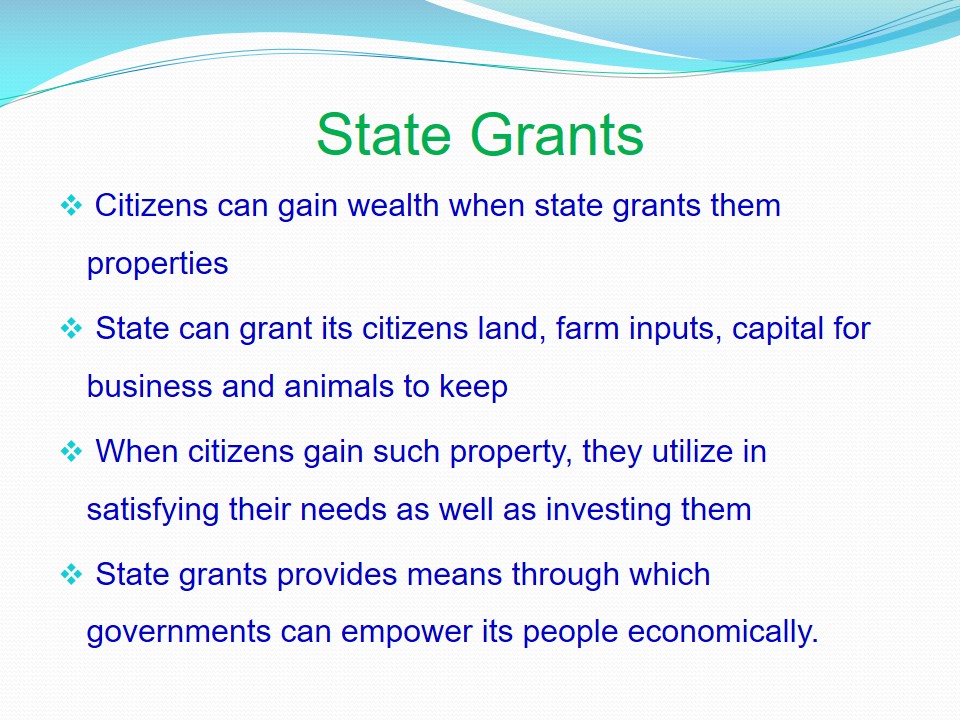
Assuming Ownership
One can assume ownership of property through the following mean:
- As a reward from another person;
- As compensation for harm caused;
- Property earned during marriage as a gift;
- Property picked up as lost;
- Compensation given to rulers for ruling.
One can assume ownership of a given property without necessarily buying it. There are five ways through which a person can own property in this manner. These ways are:- as a reward from another person, as a compensation for any form of harm caused, gifts exchanged in marriage, picking of lost property, and compensation to rulers (Nabhani and Tahrir 110). These forms of ownership are legal because an individual earns property without using immoral means.
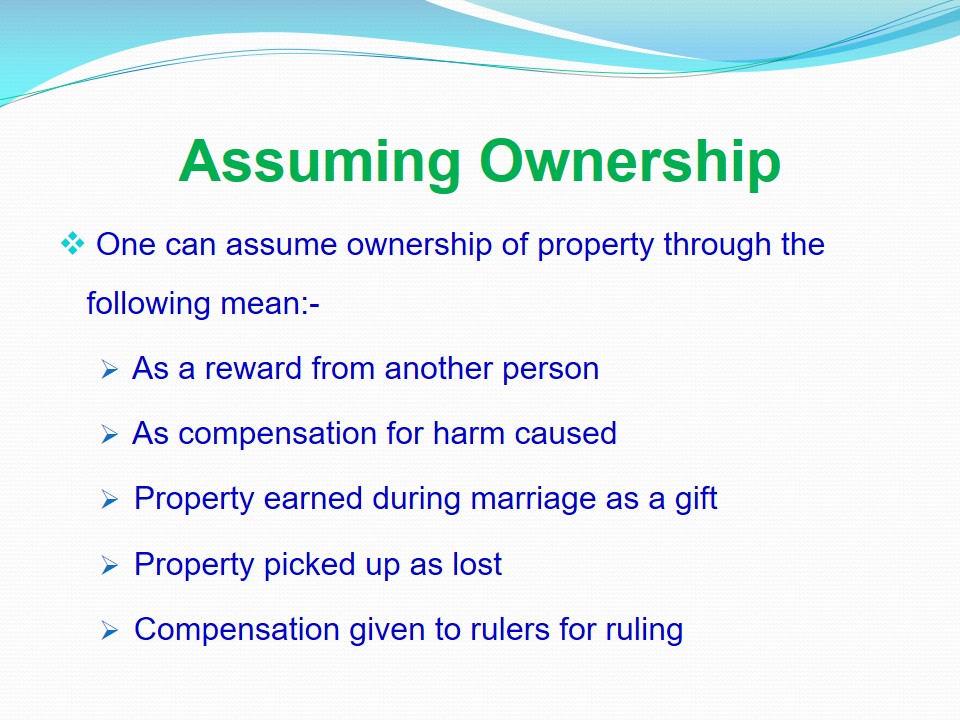
Prohibited Means of Increasing Wealth
- Gambling:
- It is harmful because it makes humans to depend on luck and cause negligence of work.
- It drains wealth and destroy families.
- It generates hatred among gamblers.
- It diverts attention to worship and prayer to Allah.
- It is wasting of time and efforts.
- It leads to crime and suicide.
Gambling entails earning and losing money through bets without performing any real work. It has harmful effects that destroy individuals, families and humanity. Gambling normally leads to over dependence on luck for earning living, negligence of work, generates hatred among gamblers, diverts attention of worshiping and praying to Allah, wasting of time, predisposes people to suicide due to loss of wealth, destruction of families, and causes crime (Mannan 50). Hence, Islam prohibits gambling as a way of increasing wealth because it has harmful effects on individuals.
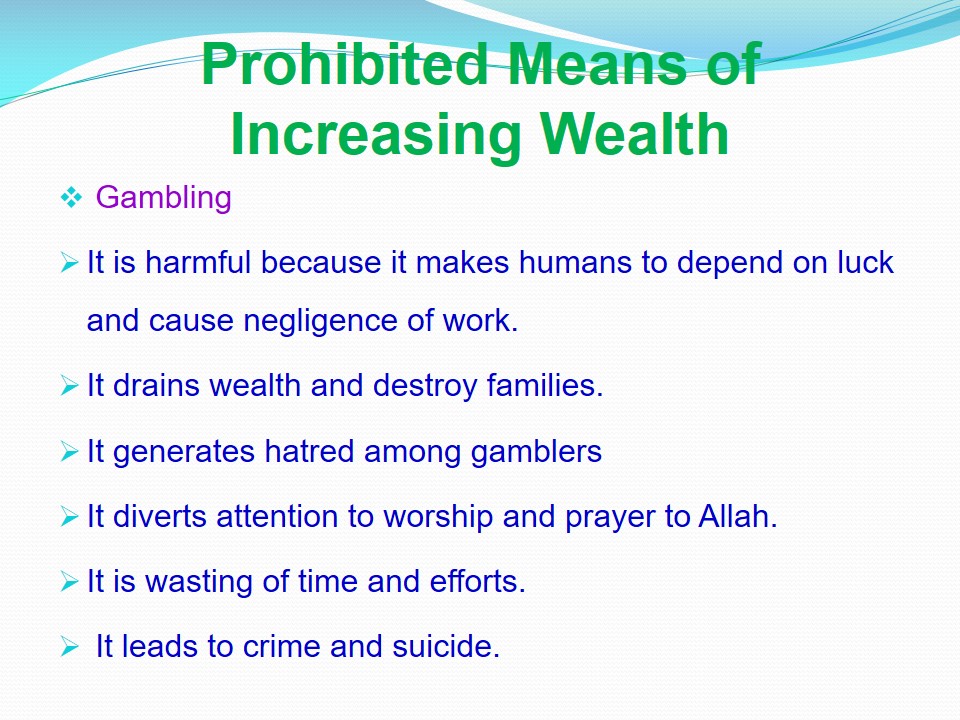
Interest (Riba)
- Islam recognizes interest as prohibited (Haram), hence illegal.
- The reason why Islam regards interest as Haram is that Muslims have a duty of helping one another.
- Demanding of interest after helping another person is against Sheri’ah law.
- The Quran regards both the person paying and receiving interest as sinners.
Islam prohibits of interests that banks do charge on borrowed loan. Charging of interests is a form of exploitation and selfishness because it does not allow people to help each other. According to Nabhani and Tahrir, “Shar’ah prohibited usury absolutely, regardless of its percentage, whether it was high or low” (173). People who take part in giving and receiving of interest are sinners for they perpetuate exploitation and selfishness in the society.
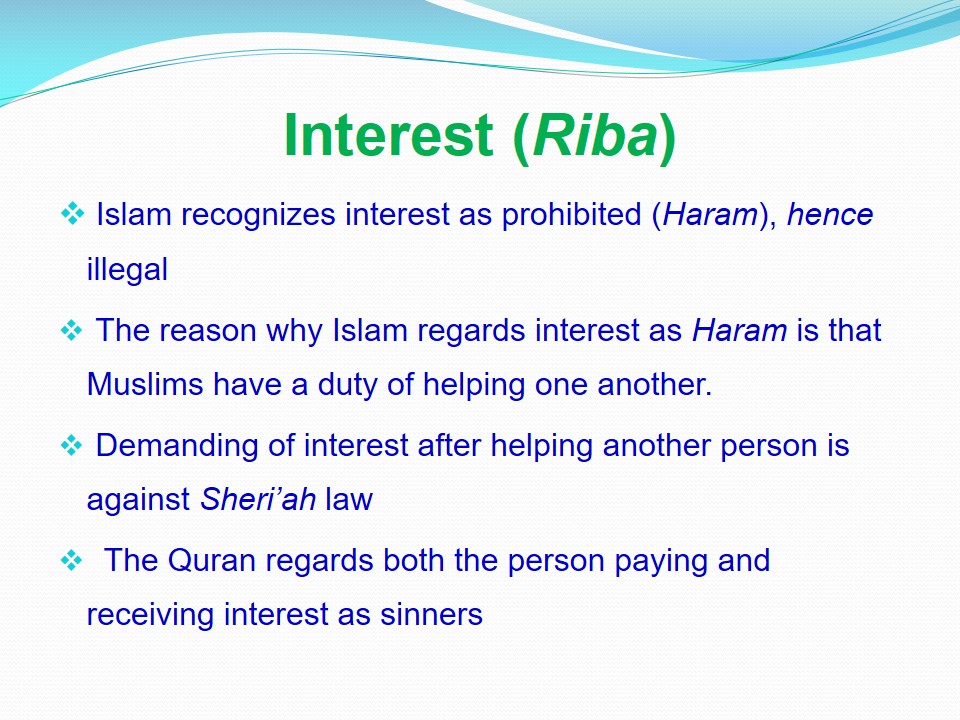
Criminal Fraud
- Criminal fraud in deceit in trading aimed at depriving customers of their wealth.
- Wealth acquired through deceit has no blessings but a curse.
- The Quran advises people to be cautious in the nature of trades they perform lest they fall into deceit.
- Thus, criminal fraud is unlawful means obtaining wealth in trade.
Criminals employ fraud in depriving customers of their wealth through deception. Criminal fraud is illegal means of acquiring wealth and the Quran prohibits it because it generates wealth that has not blessings but a curse. Therefore, the Quran advises people to be cautious in the nature of trades that they perform lest they become victims of fraud.

Conclusion
- Economic system of Islam recognizes that the economic system influence distribution of wealth in the society.
- Capitalism causes accumulation of wealth.
- Socialism deprives individuals of the right to ownership.
- The economic system of Islam discourages both capitalism and socialism.
- Islam embraces that acquisition of wealth should be legal and moral to avoid perpetuation evil in the society.
The economic system of Islam views that distribution of wealth in the society depends on the nature of economic system. While capitalism causes accumulation of wealth in the hands of the rich, socialism deprives individuals of their rights to own property. Hence, the economic system of Islam discourages both capitalism and socialism. Islam encourages legal and moral means of acquiring wealth such as work, inheritance, sustenance, government grants, and gifts amongst others. However, it prohibits immoral means such gambling, lottery, interest, and criminal fraud.
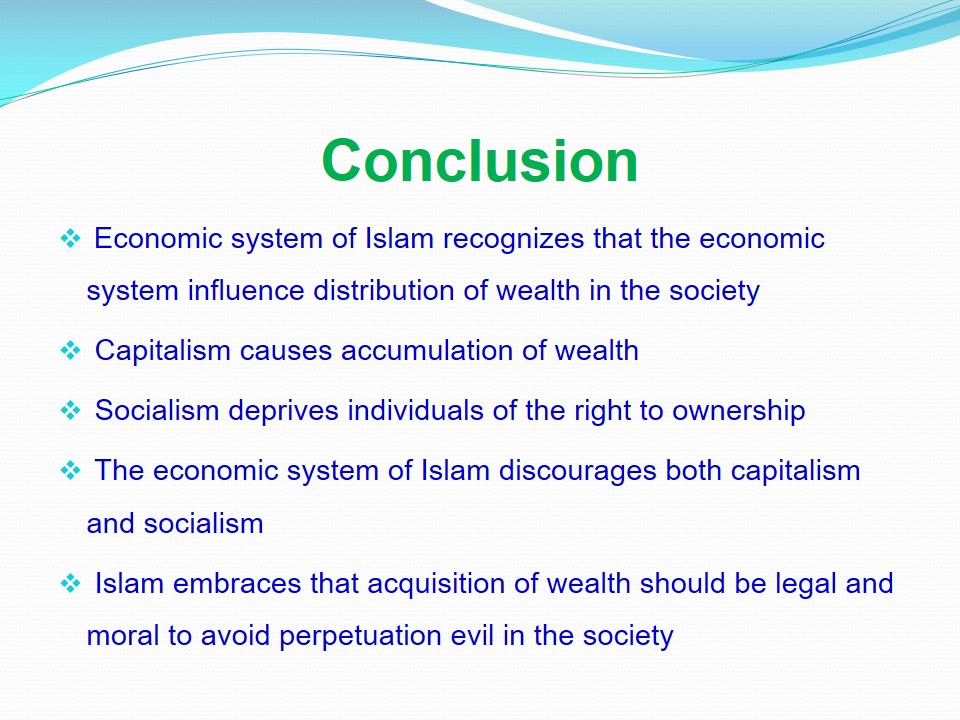
Works Cited
Kuran, Timur. “The economic system in contemporary Islamic thought: Interpretation and assessment.” International Journal of Middle East Studies 18. 2 (1986): 135-164. Web.
Mannan, Muhammad. “Abstracts of researches in Islamic economics.” International Center for Research in Islamic Economics, 2008. Web.
Nabhani, Taqiuddin, and Hizb Tahrir. The economic system of Islam. London: Al-Khilafah Publications, 2000. Web.
Qureshi, Abdul. “Economical system of Islam.” European Journal of Scientific Research 58.1 (2011): 103-107. Web.
Zaman, Asad. “Islamic economics: A survey of the literature.” International Institute of Islamic Economics, 2008. Web.